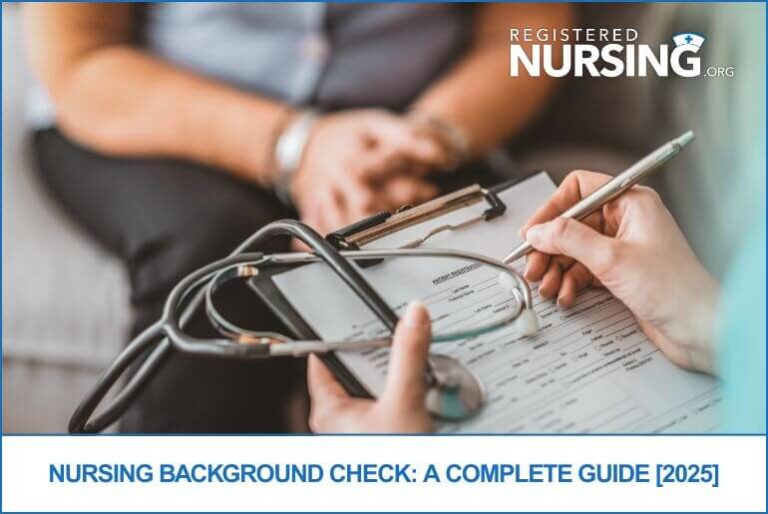Nursing Background Check: A Complete Guide 2026

As the demand for qualified nurses continues to grow, so does the emphasis on patient safety, regulatory compliance, and workforce integrity. According to the U.S. Bureau of Labor Statistics, the employment of registered nurses is projected to grow by 6% from 2022 to 2032, reinforcing the need for consistent vetting processes as more professionals enter the field. One of the most critical steps in becoming a licensed nurse is passing a thorough background check. This step ensures that individuals entering the profession uphold the highest ethical standards and are suitable for delivering care to vulnerable populations.
A nursing background check is not just a regulatory formality—it's a key safeguard to maintain trust in the healthcare system. Every state's board of nursing mandates criminal background checks prior to granting licensure, and many employers continue monitoring nurse records throughout employment. These checks aim to prevent cases of abuse, fraud, and unsafe care practices.
What to Expect in This Guide
But what exactly does a nursing background check entail? What kind of findings could result in disqualification or delays? And how should you prepare to present yourself as a trustworthy, qualified candidate? Whether you are a newly graduated RN, relocating across state lines, or seeking licensure under the Nurse Licensure Compact (NLC), this guide will provide you with an up-to-date and comprehensive overview of what to expect in 2025.
We'll cover everything from core background check components and common red flags to differences between state requirements and preparation tips. By understanding how this process works, you can approach your next career move with clarity and confidence.
Stay informed and empowered as you take your next steps in nursing. If you’re also preparing for your licensing exam, check out our guide to the NCLEX exam process, or explore your options for RN to BSN programs if you’re planning to advance your education.
Why Nursing Background Checks Matter
Nursing background checks are essential for protecting patients, maintaining workplace safety, and ensuring that licensed nurses meet strict ethical and professional standards. According to the U.S. Department of Health and Human Services Office of Inspector General (OIG), nearly one in five nurse aides with a substantiated finding of abuse or neglect had a prior criminal conviction—many involving theft or crimes against persons.
These findings underscore the importance of comprehensive screening practices. By identifying potential red flags early, employers and state boards can prevent incidents of misconduct and foster a safer healthcare environment.
What's Included in a Nursing Background Check
To ensure safe and competent care, most state boards of nursing conduct an extensive background screening before issuing or renewing a license. These checks are designed to evaluate a nurse’s history and confirm that they meet all regulatory, ethical, and legal standards for clinical practice. Below are the typical components you can expect in a comprehensive nursing background check:
- Criminal History Check: State and federal checks for convictions, including violent crimes, theft, fraud, and drug offenses.
- Sex Offender Registry Search: Verifies whether the applicant is listed as a registered sex offender.
- Employment Verification: Confirms prior job roles, tenure, and employer references.
- License and Certification Verification: Ensures the applicant holds valid, board-approved credentials.
- Abuse Registry Check: Searches databases for records of elder or patient abuse or neglect.
- Federal Exclusion Lists: Confirms the applicant is not excluded from Medicare/Medicaid participation (OIG LEIE).
- Fingerprinting: Used to authenticate identity and conduct accurate criminal checks.
- Drug Screening: Some states or employers require testing for controlled substances.
These components help verify a candidate’s suitability for practice and are required by most state boards of nursing.
Common Disqualifiers in Nursing Background Checks
While passing a background check is a requirement for nursing licensure in every U.S. state, not all findings will automatically lead to disqualification. However, there are certain red flags that may either delay the licensure process or result in denial, depending on their nature and severity. It's essential for applicants to be aware of these potential barriers and address them proactively. Certain findings in a background check may disqualify a candidate or delay the licensure process. These include:
- Violent Felonies: Homicide, assault, or domestic violence.
- Sexual Offenses: Any conviction leading to inclusion on a sex offender registry.
- Substance Abuse: Drug or alcohol convictions, especially involving workplace impairment.
- Financial Crimes: Fraud, identity theft, or embezzlement.
- Abuse or Neglect: Documented incidents of patient mistreatment.
Each case is reviewed individually by the state board, and mitigating circumstances (e.g., time passed, rehabilitation efforts) may influence outcomes. Applicants are encouraged to disclose prior offenses honestly and provide supporting documentation when applicable.
State-Specific Requirements and Variations
Background check procedures and criteria differ slightly between states. Here’s a comparison of three examples:
| State | Criminal Check | Fingerprinting | Additional Notes |
| California | State & FBI | Yes | Required through DOJ; includes Live Scan system. |
| Louisiana | State & FBI | Yes | Must submit two fingerprint cards through local law enforcement. |
| Idaho | State & FBI | Yes | Submitted to the Board of Nursing and processed via FBI. |
Always consult your state’s board of nursing for the most current requirements.
Preparing for a Nursing Background Check
Preparing in advance can significantly reduce the stress and delays often associated with background checks. From collecting essential documents to reviewing your personal records, each proactive step you take helps you stay in control of the process. Taking proactive steps before your background check can help ensure a smooth process:
- Be Transparent: Disclose any past convictions or legal issues upfront.
- Collect Documentation: Gather court records, certificates, or letters of recommendation that demonstrate rehabilitation.
- Understand Local Laws: Know your state’s laws regarding nursing licensure and background requirements.
- Check Your Records: Request a copy of your background report and verify for accuracy.
- Seek Legal Counsel: If uncertain, consult with an attorney experienced in professional licensure.
By preparing ahead of time, you increase your chances of a favorable review.
Take Your Next Step in Nursing
Understanding the intricacies of nursing background checks is crucial for aspiring and current nurses alike. These checks are not merely bureaucratic hurdles but essential measures to ensure the safety and integrity of healthcare environments. By familiarizing yourself with the components, potential disqualifiers, and state-specific requirements, you can navigate the process with confidence.
To better understand your career options after licensure, explore our detailed overview of nursing license requirements by state. Transparency and preparedness are your best tools in this process.
Sources
- U.S. Department of Health and Human Services – OIG Report
- National Council of State Boards of Nursing – Contact BON
- Office of Inspector General – Exclusion List
Latest Articles & Guides
One of the keys to success as a registered nurse is embracing lifelong learning. Our articles and guides address hot topics and current events in nursing, from education to career mobility and beyond. No matter where you are on your nursing journey, there’s an article to help you build your knowledge base.
Browse our latest articles, curated specifically for modern nurses.



